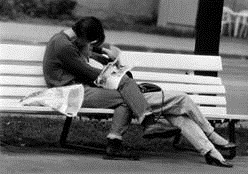
In my relationship coaching, I have discovered there are two more traps that are signs the relationship is going nowhere and may be heading for a breakdown. One of them is the “intention” trap and the other one is the “blame” trap.
The intention trap
Everyone wants to feel good in their relationships. We give ourselves to the other person and we want a good feeling in return. Usually, we find a partner who makes us feel great. At the beginning of the relationship, we want to spend lots of time together, we constantly want to be with him or her and when we are not together, we imagine us being together.
Our marriage is good when we look forward to the time we will spend together, because it boosts our self-esteem and motivates us.
Over time, this excitement gives way to stress, work and kids, and many couples just wait for the moment things are quiet, so they can veg in front of the TV, hit the bed, sleep in on the weekends or go away on a holiday. Most of their time is not filled with fun and the fun bits are pushed to the side. When we push too much of our “fun time together” to the side, the arguments start.
I do not think I have ever learned how to argue and in marriage. Strange as it may seem, I believe it is very important to learn how to argue, because if we do not argue fairly, we increase the stress and the pressure and decrease the fun time together.
Why are they saying it?

For example, a couple is arguing. Ben says, “We don’t spend enough time together. I’d like us to go to the movies more often”. Denise says, “I don’t have time for movies. I’m exhausted in the evenings. You don’t know what it’s like running around after the kids the whole day. You don’t appreciate what I go through”. That ends what could have been a nice evening and each partner goes to his or her “corner”.
People like playing “mind readers” and it is very hard for them to understand that they can feel bad without the other person having any intention of making them feel bad. When the arguments change course and we express our assumptions about the other person’s bad intention, the other person immediately defends their intention and now two people are hurt, one because he/she assumes the other wanted to hurt him/her and the other because her/his partner assumes she/he had bad intentions. It is a formula for a marriage breakdown.
Suddenly, the couple no longer talks about the topic of their disagreement but the bad feelings they both have. Every time we assume there is a bad intention, we can guarantee there will be a nasty argument. Getting out of this trap is very complicated, because both sides are hurt. One wants to lick his/her wounds and the other wants to explain her/his original intention. When people are hurt, their conversation is not very practical. Remember, we are in a relationship because we want to feel good and if we feel bad, the longer we argue, the worse we feel.
The best way to deal this problem is not to get into it and we can do it with awareness. As long as you say, “I feel, I think, I am not happy”, it is an expression of your own thoughts and feelings, but as soon as you say, “you”, you have to be very careful what you are saying. Let’s look at our example again.
Ben says, “We don’t spend enough time together. I’d like us to go to the movies more often”. Denise says, “I don’t have time for movies. I’m exhausted in the evenings”. So far, so good. Then she says, “You don’t know what it’s like running around after the kids the whole day. You don’t appreciate what I go through”.

As you would suspect, this conversation did not go well. Ben had good intentions, Denise vented and the issue stopped being spending more fun time together and started being who intended what.
Typical “intention” traps
“You make me feel…” – no one can force you to feel anything. Sometimes, I wish it was not true. I would love to force my husband, my kids, even my clients to think they are loved, awesome and powerful.
“Are you saying I’m…?” – notice that this is an interpretation of what the other person is saying. He/she did not say that. He/she said something else, so when you ask this question, you are basically saying, “I interpret this sentence as…” Take ownership of your interpretation and restate it as such.
“You only want me to think…” – that is not necessarily true. The other person may want you to think something else. Don’t read minds. You are not mind readers.

“You don’t understand…” – you do not know what happens in the other person’s mind. Understanding is a very high brain function. Make sure you do not confuse “You don’t do things the way I expect them” with “You don’t understand”. There is a very probable option that the other side understands perfectly, but still does not want to do things that way.
“You don’t listen to me” – this sentence is an oxymoron. Notice that you are using this to request that the other side will listen to you and you assume that listening will guarantee the other person will agree. There is an option that the other person has heard you clearly and still does not agree.
“Do you think it is fair to…” – this sentence assumes the other person did not think about fairness and that their intentions were towards “unfairness”. It is another way of saying, “I think you are not fair”. Rephrase it to “I think that if we do it <this way>, that would be fair”. Remember, “I” statements will ensure you are be trapped in the “intention” cycle.
“You’re mad at me…” – it is very important not to risk interpreting someone else’s intentions. It is possible he/she is mad, but it is better to let them say it than to say it on their behalf. It is possible that what they are expressing is frustration or helplessness or that they are just tired.
“What have I done that make you treat me like this?” – this is a formula for disaster. There is the assumption that you have done something that caused someone to treat you a certain way or that there is some justification for the other person to treat you like that. The behavior could be caused by a pattern that originated during childhood or that the person is tired and confused and it has nothing to do with you.

I promise that if you count how many times you use “intention” sentences in your arguments and shrink them, the cracks in the relationship will shrink too.
Happy marriage,
Ronit
This post is part of the series Save Your Marriage:
- Self-Regulation in Your Marriage
- How to Save Yourself from Divorce
- Marriage and Divorce Statistics
- The Marriage Institution
- Marriage is the Foundation of Families
- The Unpleasant Side of Divorce
- How to Get Things Wrong in a Marriage
- Marriage and Self Talk
- More About Self Talk
- Facts vs. Meaning in Marriage
- All Men Are… All Women Are…
- When Two Do Not Become One
- Marriage and Money
- Be Your Partner’s Best Friend
- Relationship Between Two Onions
- The Greatest Gift: Stay Together
- Marriage of Singles
- The "Right" Trap
- The Intention Trap
- Best Marriage Quotes that Will Change Your Life
- 10 Rules for Civilized Dialogue
- 10 Tips for Re-Building Trust
- The King and His Servants
- The Nitpicker
- Expressing Feelings in a Marriage
- Don’t Be On Guard
- Don’t Clam Up
- Have Good Sex to Save Your Marriage
- Trust (or The Boy Who Cried Wolf)
- Emergency Relationship Coaching Essentials
- Save Your Marriage with Better Time Management
- Choice Theory Can Save Your Marriage
- How to Have a Hot Relationship











